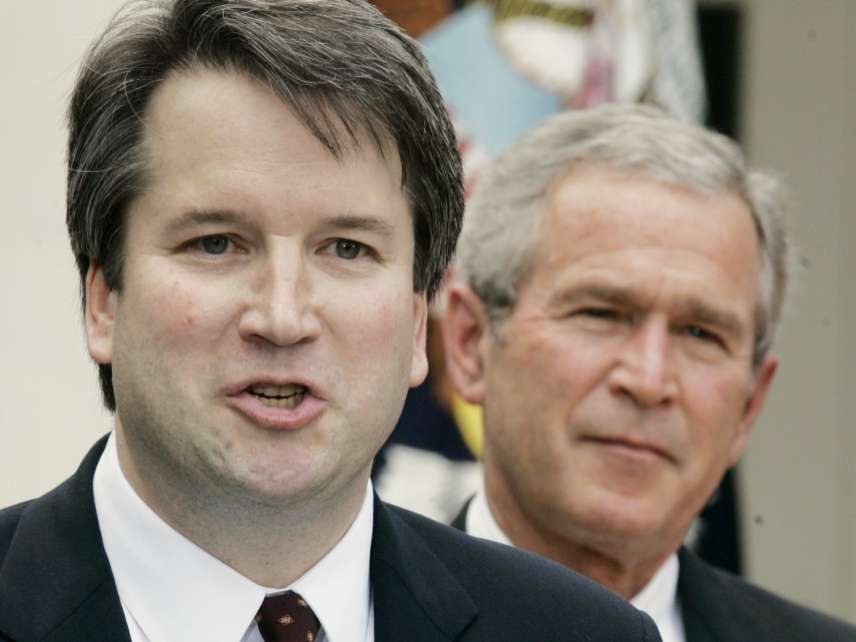SCOTUS Nominee Brett Kavanaugh Sees Perils of Aggressive Administrative State
Like Neil Gorsuch, the D.C. Circuit judge has criticized Chevron deference for encouraging executive arrogance.

When Donald Trump picked Neil Gorsuch for the Supreme Court last year, one of the most frequently heard complaints concerned the nominee's resistance to the doctrine that a court applying an ambiguous statute should defer to any "reasonable" interpretation favored by the administrative agency charged with carrying it out. If Trump chooses Brett Kavanaugh to replace Anthony Kennedy, we are likely to hear similar criticism, because the D.C. Circuit judge also has expressed concern about the threat that so-called Chevron deference poses to the rule of law and the separation of powers.
"Chevron has been criticized for many reasons," Kavanaugh observed in a 2016 book review. "To begin with, it has no basis in the Administrative Procedure Act. So Chevron itself is an atextual invention by courts. In many ways, Chevron is nothing more than a judicially orchestrated shift of power from Congress to the Executive Branch. Moreover, the question of when to apply Chevron has become its own separate difficulty."
Drawing on his experience in the George W. Bush administration, Kavanaugh wrote that "Chevron encourages the Executive Branch (whichever party controls it) to be extremely aggressive in seeking to squeeze its policy goals into ill-fitting statutory authorizations and restraints." While "it is no surprise that Presidents and agencies often will do whatever they can within existing statutes," he said, "that inherent aggressiveness is amped up significantly" by anticipation of Chevron deference. In fact, "executive branch agencies often think they can take a particular action unless it is clearly forbidden."
As a judge, Kavanaugh has tried to rein in that tendency by developing the "major questions" (a.k.a. "major rules") exception to the Chevron doctrine, which applies to agency decisions that have sweeping effects but are not clearly authorized. Last year he argued that the Federal Communications Commission's regulatory imposition of "net neutrality" clearly qualified for that exception:
The FCC's 2015 net neutrality rule is one of the most consequential regulations ever issued by any executive or independent agency in the history of the United States. The rule transforms the Internet by imposing common-carrier obligations on Internet service providers and thereby prohibiting Internet service providers from exercising editorial control over the content they transmit to consumers. The rule will affect every Internet service provider, every Internet content provider, and every Internet consumer. The economic and political significance of the rule is vast.
Kavanaugh was dissenting from a decision not to rehear a case in which a D.C. Circuit panel had upheld the FCC rule. "Congress did not clearly authorize the FCC to issue the net neutrality rule," he noted. To the contrary, Congress had debated net neutrality for years without taking legislative action to establish that policy. But if "an agency wants to exercise expansive regulatory authority over some major social or economic activity," Kavanaugh said, the Supreme Court's precedents say "an ambiguous grant of statutory authority is not enough." Therefore, he concluded, "If the Supreme Court's major rules doctrine means what it says, then the net neutrality rule is unlawful because Congress has not clearly authorized the FCC to issue this major rule."
As Notre Dame law professor Jeffrey Pojanowski noted at the time, the major questions exception offers a way to curb the problems created by Chevron deference without scrapping the doctrine entirely. "Judge Kavanaugh's careful explication and reformulation of the 'major questions' exception is an important development in its own right," Pojanowski wrote, "and a rich source for further reflection on the role of the courts in the administrative state."
Raymond Kethledge, another Supreme Court contender, also is a critic of Chevron, as Damon Root noted last week.


Show Comments (18)